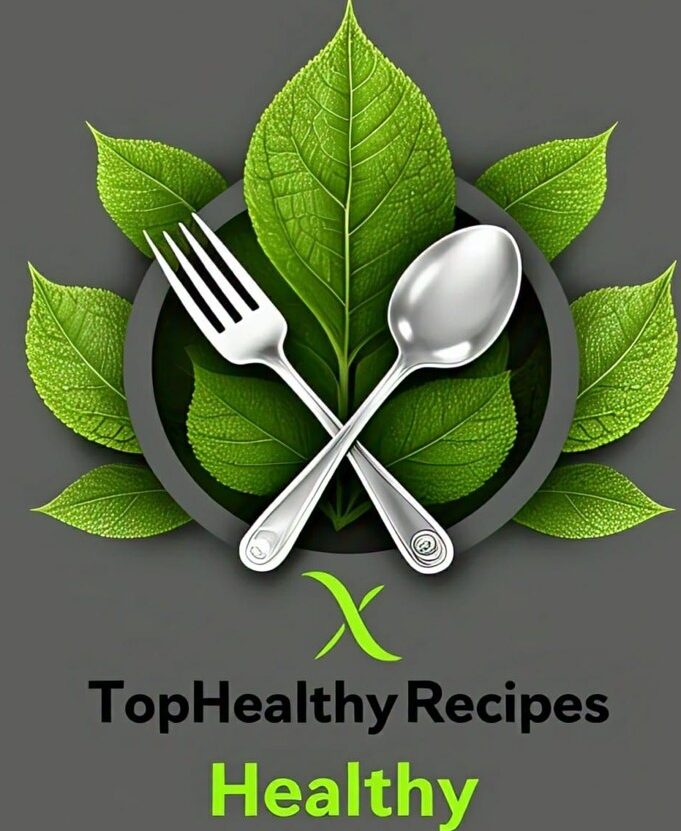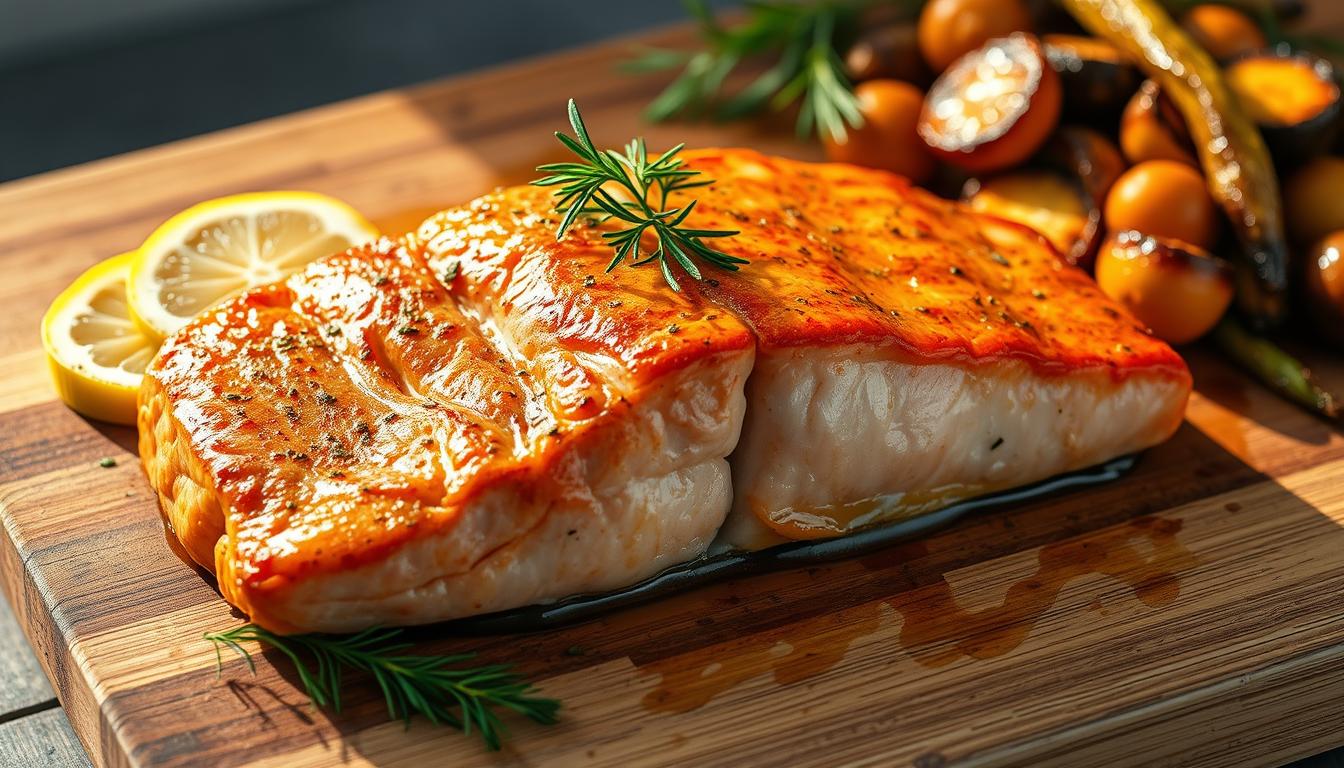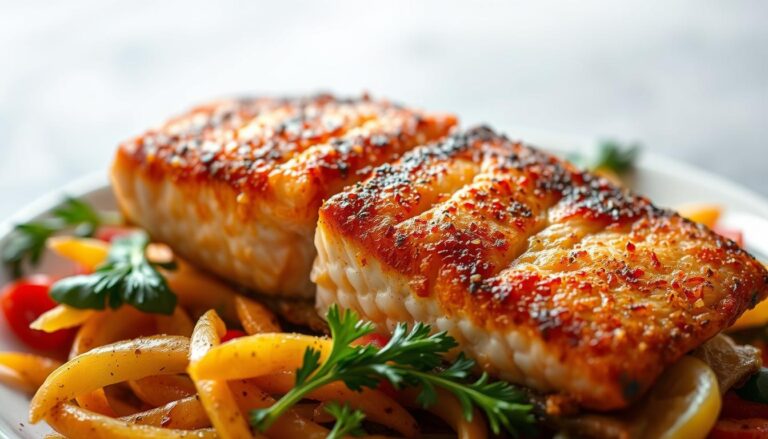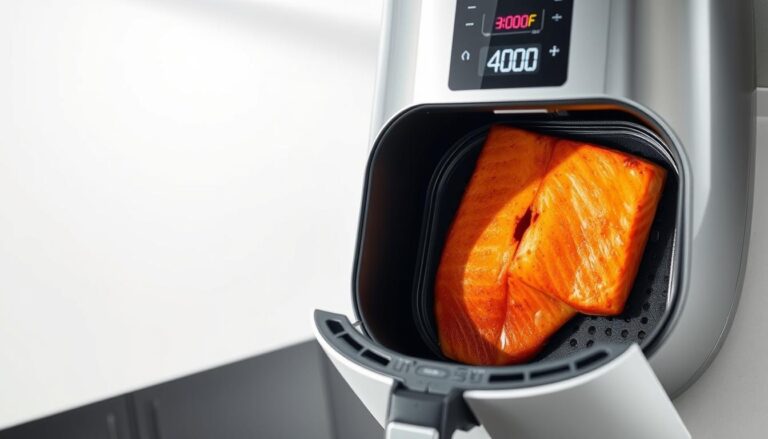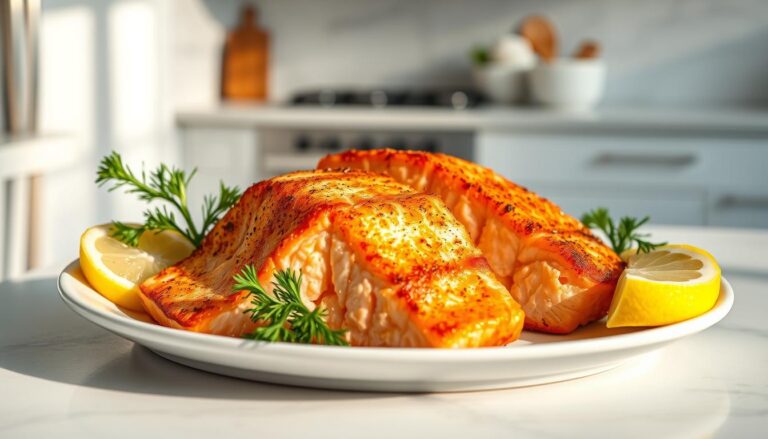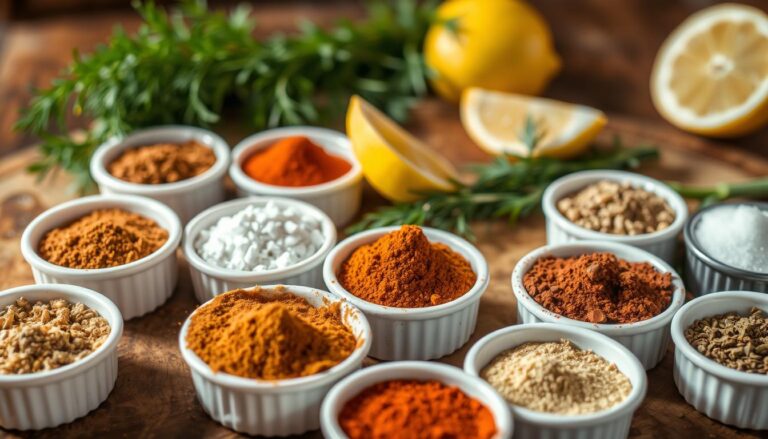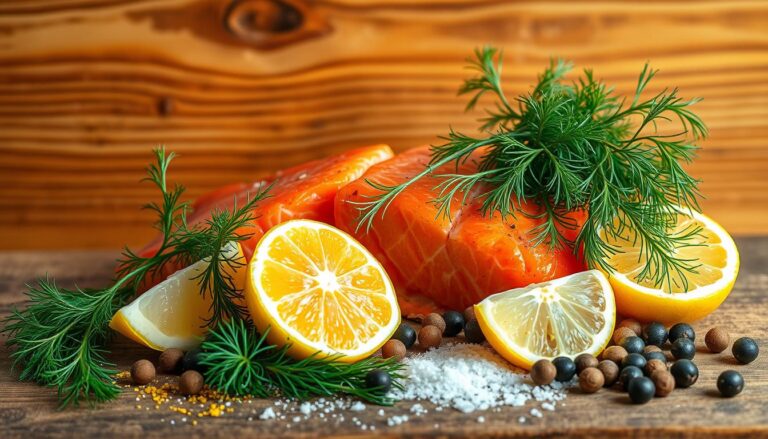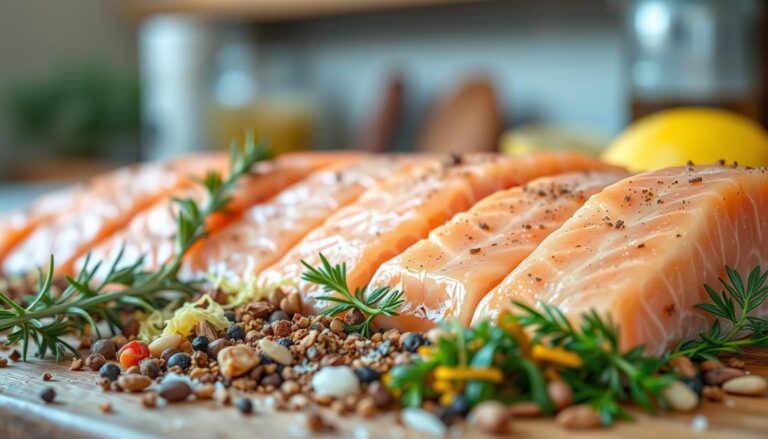Healthy Oven baked salmon cooking guide
Table of Contents
Healthy Oven baked salmon cooking guide
Looking for a dish that’s both elegant and easy to prepare? This oven baked salmon recipe is a crowd-pleaser, perfect for busy weeknights or special gatherings. With minimal prep and cleanup, it’s a go-to option for any occasion.
This dish has earned rave reviews, with over 1M views and comments like “DELISH!” and “perfect presentation.” Whether you’re cooking for two or hosting a larger group, it’s versatile and adaptable. Plus, it’s ready in just 5-30 minutes of active prep time.
Beyond its convenience, this recipe is packed with health benefits. Rich in omega-3s and lean protein, it’s a nutritious choice for any dinner. All you need is a sheet pan and a few basic ingredients to create a meal that’s both delicious and wholesome.
Key Takeaways
- Perfect for weeknights or special occasions.
- Minimal prep and cleanup required.
- Versatile for small or large gatherings.
- Packed with omega-3s and lean protein.
- Glowing reviews and easy presentation.
Why Oven Baked Salmon is a Weeknight Winner
Need a quick yet impressive meal for busy evenings? This dish is your ultimate solution. With just 5 minutes of prep and 15-25 minutes of hands-off baking, it’s a lifesaver for any weeknight. You’ll have more time to relax while it cooks to perfection.
Cleanup is a breeze, too. Simply line your sheet pan with foil or parchment paper to avoid scrubbing baked-on juices. This trick saves you time and effort, making it a practical choice for any dinner.
This recipe is incredibly versatile. Whether you’re cooking for two or hosting a group, it’s easy to scale. Use about ½ pound per person, and you’re good to go. Plus, leftovers can be repurposed into salads, pastas, or even scrambles for the next day.
Presentation is another win. Garnish with lemon slices and fresh herbs for a restaurant-worthy look. It’s a dish that’s as beautiful as it is delicious, perfect for impressing guests or treating yourself.
- 5-minute prep time with hands-off baking.
- Foil or parchment lining for easy cleanup.
- Scalable for 2-8 servings.
- Leftovers repurposed into creative meals.
- Impressive presentation with simple garnishes.
What You’ll Need for Perfect Oven Baked Salmon
Ready to create a dish that’s both simple and stunning? Gathering the right ingredients is the first step. Whether you’re a seasoned cook or a beginner, this recipe is easy to follow and delivers incredible results every time.
Essential Ingredients
Start with the basics. A fresh or frozen fillet is ideal, with the skin on to lock in moisture. Plan for about ½ pound per person. Fresh lemons are a must—use the juice for flavor and thin slices for roasting. Garlic, either fresh cloves or powder, adds a rich aroma. For the base, choose olive oil or melted butter to keep the fish tender.
Optional Additions
Want to elevate the dish? Add a touch of sweetness with honey or brown sugar for caramelization. Fresh herbs like dill or parsley bring a burst of flavor. For a twist, try pesto, chili oil, or teriyaki sauce. These additions let you customize the recipe to your taste.
| Essential Ingredients | Optional Additions |
|---|---|
| Fresh/frozen fillet (skin-on) | Honey or brown sugar |
| Fresh lemons (juice + slices) | Fresh herbs (dill, parsley) |
| Garlic (fresh cloves or powder) | Pesto, chili oil, or teriyaki sauce |
| Olive oil or melted butter | Dried thyme or oregano |
With these ingredients, you’re all set to create a meal that’s as nutritious as it is delicious. Let’s get started!
How to Choose the Best Salmon for Baking
Not all salmon is created equal—pick wisely. The type of fish you choose can significantly impact the flavor and texture of your dish. Whether you’re preparing a quick weeknight meal or a special dinner, selecting the right fish is essential.
Wild-caught sockeye or coho are excellent choices for a leaner texture. These varieties are often more flavorful than their farmed Atlantic counterparts. If you’re looking for sustainability, check for MSC certification or Seafood Watch recommendations. These labels ensure your fish is sourced responsibly.
Fresh or frozen? Both options work well. Flash-frozen salmon retains its nutrients and is often just as good as fresh. Simply thaw it overnight in the fridge for the best results. If you prefer skinless fillets, ask your fishmonger to remove the skin before cooking.
For a standout choice, consider Bristol Bay sockeye. Known for its sustainability and high astaxanthin content, this variety offers a rich flavor and vibrant color. It’s a top pick for any recipe.
| Type of Salmon | Key Features |
|---|---|
| Wild-Caught Sockeye | Lean texture, rich flavor, sustainable |
| Wild-Caught Coho | Mild flavor, firm texture, eco-friendly |
| Farmed Atlantic | Thicker, milder taste, widely available |
| Bristol Bay Sockeye | High astaxanthin, vibrant color, sustainable |
With these tips, you’re ready to choose the best salmon for your next dish. A little attention to detail can elevate your meal from good to unforgettable.
Step-by-Step Guide to Oven Baked Salmon
Mastering the art of cooking fish doesn’t have to be complicated. This step-by-step guide will walk you through the process, ensuring a delicious and perfectly cooked dish every time. From prep to plating, we’ve got you covered.
Preparing the Salmon
Start by lining your baking sheet with foil and parchment paper. This prevents sticking and makes cleanup a breeze. Arrange thin lemon slices and fresh herbs like dill or parsley on the sheet. Place the fish on top for an infused flavor.
Creating the Sauce
In a small bowl, whisk together melted butter, olive oil, honey, minced garlic, salt, and pepper. Brush this mixture evenly over the fish, ensuring every part is coated. Add a splash of fresh lemon juice for extra brightness.
Baking the Salmon
Preheat your oven to 375°F for thicker cuts or 400°F for individual fillets. Bake until the internal temperature reaches 140°F at the thickest part. Let it rest for 5 minutes to reach 145°F. For a golden crust, broil for 3 minutes before serving.
How to Tell When Your Salmon is Perfectly Cooked
Cooking fish to perfection is easier than you think. The key is knowing the right indicators to look for. Whether you’re a beginner or a seasoned cook, these tips will ensure your dish turns out just right.
First, use a thermometer to check the internal temperature. Insert it into the thickest part of the fish. The FDA recommends 145°F for fully cooked fish. This ensures it’s safe to eat while remaining moist and tender.
Another way to check is by using a fork. Gently press into the flesh—if it flakes easily, it’s done. The texture should be firm yet tender, not rubbery or dry. Avoid translucent centers; the flesh should be opaque pink throughout.
After removing it from the heat, let it rest for 5 minutes. This allows carryover cooking to bring the temperature to the ideal 145°F. It also helps the juices redistribute, keeping the fish moist.
| Indicator | What to Look For |
|---|---|
| Temperature | 145°F in the thickest part |
| Texture | Flakes easily with a fork |
| Appearance | Opaque pink, no translucent centers |
| Resting Time | 5 minutes for carryover cooking |
With these simple steps, you’ll always know when your dish is perfectly cooked. Enjoy a meal that’s both delicious and safe to eat!
What to Serve with Oven Baked Salmon
Wondering what complements your main dish for a balanced meal? The right side can elevate your dinner, making it both satisfying and flavorful. Whether it’s a quick weeknight meal or a special occasion, pairing options are endless.
For a hearty choice, try lemon-herbs roasted potatoes. They soak up the pan juices beautifully, adding a burst of flavor. If you prefer lighter options, steamed broccolini or sesame bok choy are excellent. A fresh arugula salad drizzled with olive oil also works wonders.
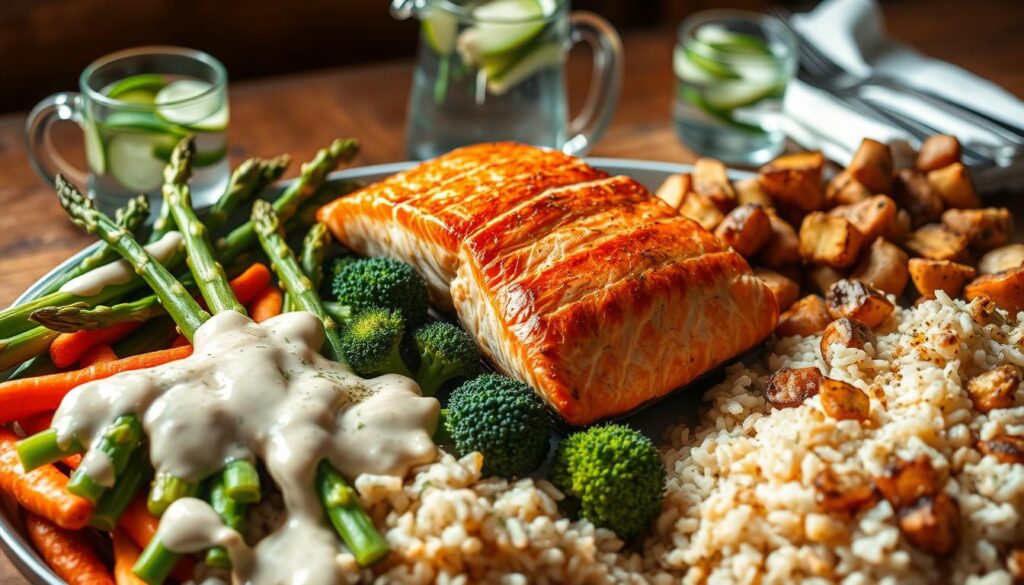
Starches like quinoa, wild rice, or crusty bread are great for rounding out the meal. They add texture and make the dish more filling. For a complete experience, pair your dinner with a glass of Sauvignon Blanc or Pinot Noir. These wines complement the flavors perfectly.
- Lemon-herb potatoes for a hearty touch.
- Light sides like broccolini or arugula salad.
- Starches such as quinoa or wild rice.
- Wine pairings: Sauvignon Blanc or Pinot Noir.
With these pairing ideas, you can create a meal that’s both delicious and well-rounded. Experiment with different combinations to find your favorite!
How to Store and Reheat Leftover Salmon
Make the most of your leftovers with these simple tips. Proper storage and reheating can keep your dish fresh and flavorful for up to 3 days. Start by letting it cool completely before transferring it to an airtight container. This prevents moisture loss and keeps the texture intact.
When reheating, gentle methods work best. Use 30-second intervals in the microwave or steam it in a skillet to avoid drying it out. For the best texture, consider enjoying your leftover cold. It’s perfect for adding to salads, pasta, or scrambled eggs.
Freezing is not recommended, as it can alter the texture and make the fish less enjoyable. Stick to refrigeration for the best results. Here’s a quick guide to reheating methods:
| Method | Instructions |
|---|---|
| Microwave | 30-second intervals, covered with a damp paper towel. |
| Skillet | Steam with a splash of water or broth over low heat. |
| Cold Use | Add to salads, pasta, or scrambled eggs. |
With these tips, you can enjoy your meal just as much the second time around. Proper storage and reheating make all the difference!
Health Benefits of Oven Baked Salmon
Discover why this dish is not just delicious but also a powerhouse of nutrients. Packed with essential vitamins and minerals, it’s a smart choice for your overall well-being.
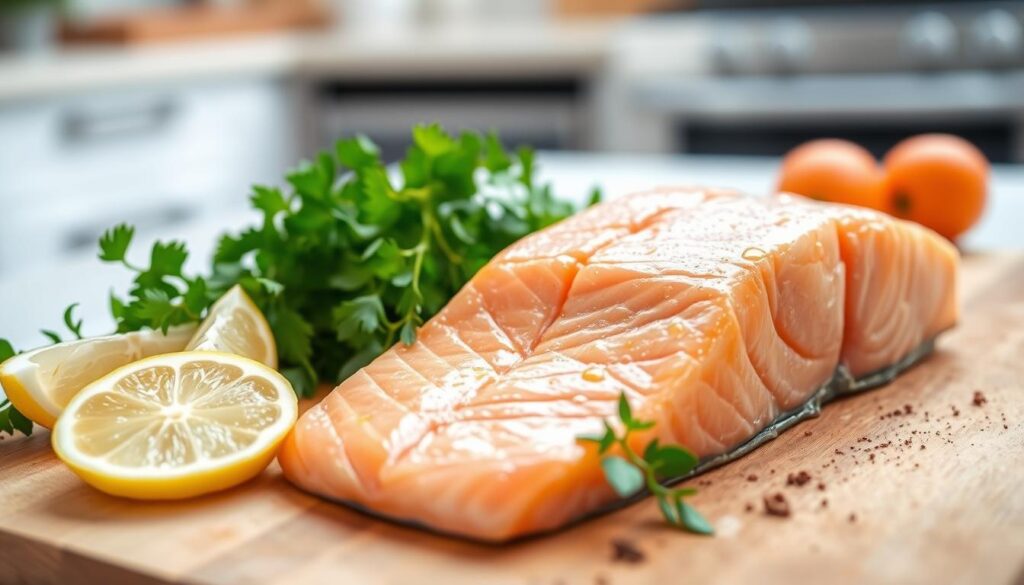
One of the standout features is its high omega-3 content. These fatty acids are known to reduce inflammation and support brain health. Regular consumption can also promote better heart health by lowering cholesterol levels.
This dish is also an excellent source of protein, providing about 28 grams per 5.3-ounce serving. Protein is essential for muscle repair and keeping you full longer, making it a great addition to any meal.
Rich in potassium, vitamin D, and B12, it helps maintain strong bones and supports your immune system. Wild varieties contain astaxanthin, a potent antioxidant that fights free radicals and supports skin health.
- High in omega-3s: Reduces inflammation and supports brain health.
- Excellent protein source: Keeps you full and aids muscle repair.
- Rich in vitamins: Boosts immunity and strengthens bones.
- Contains astaxanthin: A powerful antioxidant for skin health.
Incorporating this dish into your diet is a simple way to enjoy a meal that’s both tasty and beneficial for your body. It’s a win-win for your health and your taste buds.
Common Mistakes to Avoid When Baking Salmon
Avoiding common pitfalls can make all the difference in your cooking. Even small errors can turn a delicious dish into a disappointing one. Here’s how to steer clear of the most frequent mistakes.
One major issue is overcooking. This can leave your fish dry and chalky. Always use a timer and check the internal temperature to ensure it reaches 145°F. This keeps the texture moist and tender.
Another mistake is skipping parchment paper. Lemon juice can react with foil, creating a metallic taste. Line your pan with parchment to avoid this issue and make cleanup easier.
Underseasoning is another common error. Generously apply salt pepper and fresh herbs for maximum flavor. Dried herbs can lack the vibrant taste of fresh ones, so opt for the latter whenever possible.
Finally, avoid crowding the pan. Leaving space between fillets ensures even heat distribution. This helps each piece cook uniformly, preventing undercooked or overcooked spots.
- Overcooking: Use a timer and check the temperature.
- Skipping parchment: Prevents metallic taste from lemon and foil.
- Underseasoning: Apply salt, pepper, and fresh herbs generously.
- Crowding the pan: Ensure even heat distribution.
Variations of Oven Baked Salmon Recipes
Spice up your dinner routine with these creative twists. Whether you’re craving something zesty, savory, or sweet, these recipes offer something for everyone. Each variation is easy to prepare and packed with flavor.
For a fresh and tangy option, try the Lemon-Dill version. Swap rosemary for fresh dill and add extra lemon slices. This combination brings a bright, herby flavor that pairs perfectly with the fish.
If you love rich and savory dishes, the Garlic Butter recipe is a must. Double the garlic and add a Parmesan crust for a crispy, golden finish. It’s a crowd-pleaser that’s sure to impress.
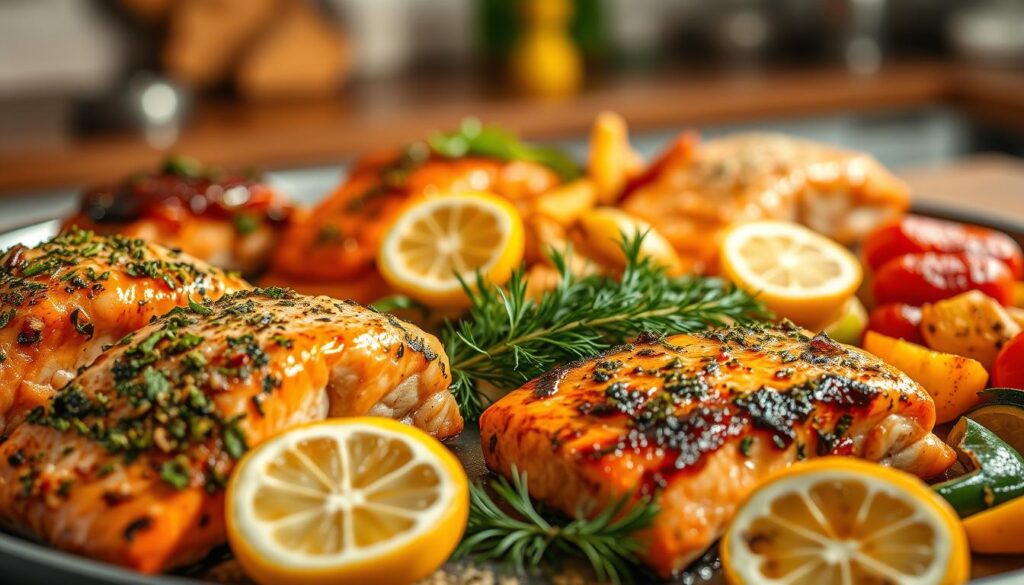
For those who enjoy a bit of heat, the Spicy rub is a game-changer. Combine chili powder and smoked paprika for a bold, smoky kick. It’s perfect for adding excitement to your meal.
Craving something with an Asian flair? The Asian-Inspired glaze is your go-to. Mix soy sauce, ginger, and sesame oil for a sweet and savory coating. It’s a unique twist that’s both delicious and easy to make.
| Variation | Key Ingredients |
|---|---|
| Lemon-Dill | Fresh dill, lemon slices |
| Garlic Butter | Double garlic, Parmesan |
| Spicy | Chili powder, smoked paprika |
| Asian-Inspired | Soy sauce, ginger, sesame oil |
These variations let you customize your meal to suit your taste. Experiment with different flavors to find your favorite. With these ideas, dinner will never be boring again!
Conclusion
This dish combines simplicity and flavor for a meal you’ll love. With just five ingredients and minimal cleanup, it’s perfect for any dinner. Whether you’re meal prepping or entertaining, this recipe adapts effortlessly to your needs.
For the best results, try using Bristol Bay sockeye. Its rich flavor and vibrant color elevate the dish to a whole new level. Plus, it’s a sustainable choice you can feel good about.
Ready to show off your skills? Share your creation on Instagram and tag #SalmonMaster. We can’t wait to see what you cook up!
FAQ
how long to bake salmon
Why is oven baked salmon a great weeknight dinner option?
What are the essential ingredients for baking salmon?
How do I choose the best salmon for baking?
How long does it take to bake salmon in the oven?
What’s the best way to tell if salmon is cooked perfectly?
What sides pair well with oven baked salmon?
How should I store and reheat leftover salmon?
What are the health benefits of eating salmon?
What are common mistakes to avoid when baking salmon?
Are there variations to try with baked salmon recipes?
For more cooking tips, stay connected with us. We also recommend the cookbook Skinnytaste Simple: Easy, Healthy Recipes with 7 Ingredients or Fewer
For more Recipes about Salmon
